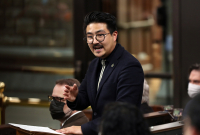Jason Kenney says he doesn't need to win leadership review by a big number

Alberta Premier Jason Kenney says he doesn’t need overwhelming support in a leadership review because the pool of voters has been diluted by thousands of angry members bent on destruction.
“This is a totally different dynamic,” Kenney said from Washington, D.C., where he was to appear Tuesday before a Senate committee to discuss the North American energy situation.
“People who are saying (I have) to get, say, 90 per cent or something (similar) really aren’t appreciating the different context of this.”
Kenney has been criticized, even by those within his caucus, for promising to stay as leader even if he receives a bare majority of 50 per cent, plus one, from 59,000 potential United Conservative Party members sending in ballots.
The results of the mail-in review are to be announced Wednesday. With less than majority support, Kenney would have to step down and a leadership race would need to be called.
Normally in such reviews, leaders consider two-thirds to three-quarters support a minimum bar.
Former Alberta premier Ralph Klein left soon after receiving 55 per cent of the vote in 2006. Two subsequent premiers, Alison Redford and Ed Stelmach, left due to internal party and caucus unrest after receiving 77 per cent.
Kenney said leadership reviews are typically one of many issues voted on by 1,000 or so party members at a general meeting, but noted this one is a month-long, mail-in vote by anyone who holds a membership.
Of that voting pool, Kenney said, a significant number signed up to cause harm to the big-tent conservative party he helped construct from the merger of the Progressive Conservative and Wildrose parties in 2017.
“We do know that thousands of people signed up (to vote in the review) who had never before been members of the UCP, the PCs or the Wildrose parties, largely driven by anger over things like (COVID-19) vaccines,” he said.
“I don’t expect many of those people to stick around,” he added.
“They came into this vote to destabilize the government, and that cohort typically has never before been involved in a mainstream centre-right party.”
The review was delayed last year and then set for an in-person ballot April 9 in Red Deer, Alta. The party cancelled that vote at the last minute when 3,000 or so expected voters ballooned to 15,000.
The party said it couldn’t logistically handle so many people. But Kenney critics have said his team persuaded the board to make the change to a mail-in ballot because it believed thousands of new members had signed up to oust Kenney. The party has denied that was the reason.
Kenney has framed the vote not as a yes-no referendum on whether he has done a good job, but rather as a takeover bid by fringe extremists and hate pedlars. In leaked audio, he is heard to refer to them as kooks, lunatics and insects, all angry over restrictions he brought in to try to fight the COVID-19 pandemic.
His critics, including a number of his own backbenchers, say it’s about more than that. They have labelled Kenney as a populist charlatan who ran on a promise to listen to the grassroots, but once in power imposed a top-down government run by himself and a clutch of close advisers.
The party has struggled at the polls for more than a year, but Kenney said Monday the future looks bright for him and the UCP as the Alberta economy rebounds.
“I was involved with (former prime minister) Stephen Harper in helping to create the merger that led to the Conservative Party of Canada and a decade in office federally,” said Kenney.
“I was the central leader of the merger of conservative parties in Alberta. I led us to the largest electoral mandate in the history of Alberta politics (in 2019) with over a million votes.
“I’ve never lost an election and I don’t plan on doing so now.”
This report by The Canadian Press was first published May 16, 2022.




Comments